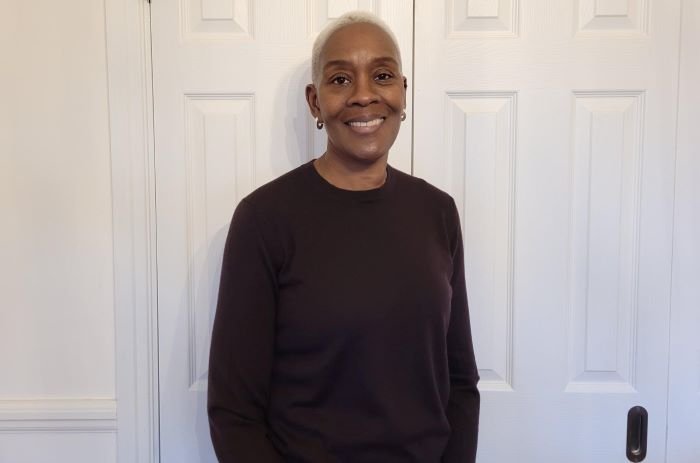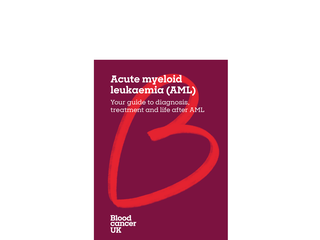What I’ve learned about the emotional impact of treatment
Yvonne’s diagnosis and treatment happened so quickly, she hardly had time to process what was happening at first. But as treatment continued, the emotional impact grew. Here Yvonne shares the techniques that helped her through it.

Yvonne, diagnosed with AML
At first, I had no emotional response. I was in denial, in shock.
Being diagnosed with acute myeloid leukaemia (AML) when I felt generally well in myself was a shock to me. I was admitted straight into hospital to start chemotherapy, and I didn’t leave the hospital for a month. It felt surreal to me at this point, and I didn’t even process it, because this huge diagnosis just didn’t marry up with how I was feeling. The enormity of it was too much for my mind to deal with.
I wasn’t thinking about how I was dealing with the news at this time, I was just focusing on what my haematologist had told me: AML is curable and treatable.
I wanted to just get on with the treatment, I wanted to get better. I think I was in denial or was mentally trying to protect myself, but the reality of what I was going through hadn’t registered at that point. Now I know lots of other people with AML say this too – it’s a natural reaction to pure shock.
Facing treatment, I began to feel scared.
Before treatment, I was full of fear. I’d heard horror stories of people having a rough time with chemo and I was scared that the treatment wouldn’t work.
All I really knew was that the treatment would be intensive and take months. I found it hard seeing others on the ward getting sicker and suffering side effects. It was scary to think that this might be me.
As my body and appearance continued to change, I felt less and less like myself.
Not only was I dealing with the treatments and the diagnosis, but I also had to adapt to my body suddenly changing too. I almost had a lack of faith in my own body, as I hadn’t had warning signs of the AML before I was diagnosed. And with all the treatments I was having, I never knew how my body was going to respond. During chemotherapy, I experienced so many changes to the way my body worked, it felt alien to me!
Losing my hair and becoming so bloated from the treatments were hard things to get my head around. I’m usually slim and active and I felt far from my normal self. The constantly fluctuating symptoms in treatment can be overwhelming. I was always thinking ‘what’s next?’ and worrying that I would be permanently dealing with my symptoms. Getting clarity from the nurses about why I was experiencing my symptoms gave me reassurance and helped calm my mind.

Yvonne helped create this guide to AML
She shares lots more tips in the booklet. The guide covers diagnosis, treatment, coping with AML and life after AML.
I had to find ways to stop my worries getting out of control
I did find ways during treatment to keep my mental health intact. Some came naturally to me, others I had to work at. I want to share them, in case I can help anyone else going through the whirlwind of AML treatment.
1. Focus on the present moment
I’m a great believer in mindfulness and being in the present moment. It’s all about being accepting of the moment you’re in and focusing on that, because otherwise the uncertainty of what’s around the corner can become frightening. You’ve got to have faith in your medical team and trust they know what they are doing. Have faith you’re going to be okay and don’t get caught up in all the “what ifs”.
Sometimes you need to force your mind to stop thinking about the cancer. Find something distracting to do that fits your interests. Things like puzzles, reading, or adult colouring books can take you out of your mind and into the present moment.
Body changes are really hard to cope with, especially hair loss or changes to your body size or shape. But again, focusing on the present can help. You ultimately have to accept it, and remember, it won’t last forever. I had to keep saying to myself “This too will pass”.
2. Stay positive (but this doesn’t mean never feeling scared!)
I know this is so much easier said than done, but even in dark times, it is possible to change your mindset. Each day, look for something that gives you pleasure or that you can be grateful for. Some days that can be really hard to find if you’re struggling or in pain, and if that’s the case, focus on the smallest of things. Finding something on TV funny, being able to taste a food again, or walking to the end of the ward – it’s important to recognise these things to give us hope for the next day.
Being positive doesn’t mean never feeling scared or sad. You can still acknowledge you are in a scary place. Allow yourself to feel these things when they come, and talk to someone about it – a nurse, doctor, fellow patient or a friend. But at the same time, try to find something positive to balance things out, however small it is.
Of course, there is a spectrum of how this illness treats people, and some will find it harder than others. Our lives are so different in terms of what else we are dealing with at home, and we all experience cancer differently, but trying to be positive whilst going through treatment can help.
3. Keeping a diary
I kept a diary throughout my treatment, because every day was starting to merge into one. I’m glad I did, because reading it back after finishing treatment has made me realise how grateful I am to have come through that. It’s also helped me come to terms with the emotional impact that the treatment had on me.
Once treatment finishes, it’s easy for people to forget what you’ve been through
Unlike other cancers where you may have invasive surgery and have scarring to your body as a result, with blood cancer there’s no physical sign of what you’ve been through. When people can’t see that, it’s easy for them to forget what you’ve been through. I’m so grateful I’ve recovered, but that doesn’t mean I’m not feeling the effects emotionally or even physically still too.
Having gone through what I did with such urgency and no preparation, I felt at the time like I was just put on a treadmill, and I just did what I was told and what I needed to do to get through each day. After treatment, I had this real awakening to the enormity of what I’d been through and just how traumatic I had found it.
A lot of people think that when you get the all clear, life seemingly goes back to normal. But it’s not the end of it all, and I think only those who have lived through it appreciate that. It takes time to mentally process what you’ve been through, and even if you’re fully better physically, the mental journey can take longer.
Seeking support
Whilst I was going through treatment, I was riding the waves as they happened. I knew there were services there to support me, but I didn’t feel the need to tap into them yet. A year ago, the hospital contacted me and asked if I wanted to join an online support group for people living with blood cancers, so I thought I’d give it a try and I’m so glad I did.
On the first session, what struck me was how reassuring it was to share an experience and have someone else say “yes, that happened to me too” or “I feel the same”. Although we all have different blood cancers and are at different stages of recovery, there’s still a shared understanding of what our experience has been like.
Lots of people with blood cancer say they'd like more emotional support. Ask your healthcare team about your options and you can also join our online community forum and share your experiences of blood cancer there.

Mind and Emotions
Find ways to manage your emotional wellbeing and get the support you need.

